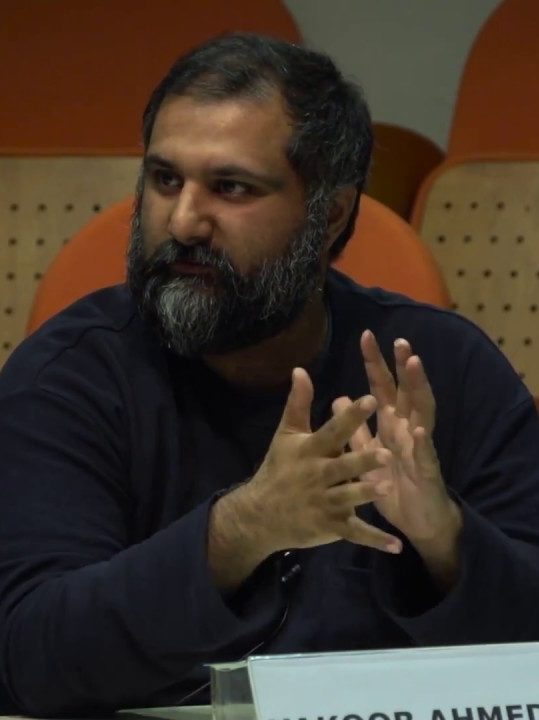
Much of what has been written regarding Ottoman history has been shaped by
ideology, narrative, and language either within academia or by the nation-states that
emerged from the previous Ottoman domains. While many of these narratives are
starting to be revised, nonetheless general Muslim engagement in knowledge
production about the once-powerful Islamic dynasty still continues to lag. While
interest has started to increase, though there is still a need for more Muslim voices
to study history in general and Ottoman history in particular so that a plurality of
views from within the Muslim worldview can be represented. This episode
examines the intellectual currents in both early and late Ottoman history drawing
largely from original sources. It also sheds light on the amnesia regarding the
reluctance in the apprehension of four hundred years of the Ottoman Caliphate.
Yakoob Ahmed

Doktorasını 2017 yılında, Londra’da bulunan SOAS Üniversitesinin Yakın ve Ortadoğu Araştırmaları bölümünde “ Osmanlı Ulemasının Anayasalaşma Hareketleri ve 1908-1909 Tartışmalarında Rolü” başlıklı teziyle tamamlayan Yakoob Ahmed, aynı zamanda Şehir Üniversitesinde misafir araştırmacı olarak bulunmuştur ve halen İstanbul Üniversitesi İlahiyat fakültesinde öğretim görevlisi olarak çalışmaktadır. Dr Ahmed yerel ve uluslararası düzeyde pek çok platformda konferanslar vermiştir. Tokya’da Toyo Banko, İngiltere’de Brais konferansları; Fransız enstitüsü ve Orient enstitüsün İstanbul’da “Osmanlı ve İran’da Anayasalaşma Hareketleri” adı altında düzenlediği ortaklaşa konferansta ve dahi pek çok yerde araştırmalarını sunmuştur. Aynı zamanda Ibn Haldun üniversitesinin düzenlemiş olduğu Ihsan Academy’de; buna ilaveten Bilim ve Sanat Vakfı (Bisav)’nda muhtelif dersler vermiştir. Öte yandan, Malezya’da bulunan CASIS enstitüsünde de araştırmalar yapan Ahmed, İslam tarihi, çağdaş İslam düşüncesi, geç dönem Osmanlı tarihi ve buna benzer alanlarda dersler vermektedir. İlgi alanları arasında; İslam Düşüncesi, İslam Tarihi, Kimlik ve Toplumsal Hafıza, Milliyetçilik ve Ulus devleti, Geç Dönem Osmanlı Tarihi yer almaktadır.
Bibliography & Further Readings
Ottoman History
- Abu-Uksa, Wael. “Freedom in the Arab World Concepts and Ideologies in Arabic Thought in the Nineteenth Century”, Cambridge University Press, 2016.
- Abu-Manneh, Butrus. “Arab-Ottamanists’ Reactions to the Young Turk Revolution.” In Late Ottoman Palestine: The Period of Young Turk Rule, edited by Yuval Ben-Bassat and Eyal Ginio. I.B.Tauris, 2011.
—– “The Islamic Roots of the Gülhane Rescript.” Die Welt Des Islams 34, no. 2 (1994).
—– “Two Concepts of State in the Tanzimat Period: The Hatt-I Şerif of Gülhane and the
Hatt-I Hümayun.” Edited by Kate Fleet. Turkish Historical Review- Brill 6, no. 2 (2015). - Ahmad, Feroz. “The Young Turks and the Ottoman Nationalities : Armenians, Greeks, Albanians, Jews, and Arabs, 1908-1918″ , Salt Lake City, The University of Utah Press, 2014
- Akarlı, Engin. “The Tangled Ends of an Empire: Ottoman Encounters with the West and Problems of Westernization—an Overview.” Comparative Studies of South Asia, Africa and the Middle East, Duke University Press 26, no. 3
- Akiba, Jun. “The Local Councils as the Origin of the Parliamentary System in the Ottoman Empire.” In Development of Parliamentarism in the Modern Islamic World, edited by Sato Tsugitaka. Tokyo: Tokyo Bunko, 2009.
- Anscombe, Frederick F. “State, Faith, and Nation in the Ottoman and Post-Ottoman Lands”. New York: Cambridge University Press, 2014.
- Anderson, Lisa “Nineteenth Century Reform in Ottoman Libya,” International Journl of the Middle East Studies 16 (1984) pp325-348
- Ayoub, Samy. “The Mecelle, Sharia, and the Ottoman State: Fashioning and Refashioning of Islamic Law in the Nineteenth and Twentieth Centuries,” Indiana University Press, January 2016.
- Deringil, Selim, “The Well Protected Domains: Ideology and Legitimization of Power in the Ottoman Empire“, 1876-1909, (London, 1998)
- Ghazal, Amal. “Sufism, Ijtihad and Modernity: Yusuf al-Nabahani in the Age of Abdul- Hamid II”, Archivum Ottomanicum 19 (2001) pp.239-272
- Fahmy, “Khaled, In Quest of Justice: Islamic Law and Forensic Medicine in Modern Egypt” (University of California, 2019)
—– “All the Pasha’s Men: Mehmed Ali, his Army and the Making of Modern Egypt”(Cambridge University Press, 1997)
—— “Mehmed Ali”, (Oneworld Publications, 2008) - Halevi, Leor, “Modern Things on Trail: Islam’s Global and Material Reformation in the Age of Rida, 1865-1935”, (Columbia University Press, 2019)
- Hanioğlu, M. Şükrü. “The Young Turks in Opposition”. (New York 1995)
—– “Preperation for a Revolution: The Young Turks: 1902-1908”, (Oxford 2001)
—– “A Brıef Hıstory of the Late Ottoman Empire” (Princeton University Press, 2010). - Herzog, Christoph, and Malek Sharif eds., “The First Ottoman Experiment in Democracy”, Istanbuler Texte Und Studien, Bd. 18. Würzburg: Ergon in Kommission, 2010.
- Hassan, Mona, “Longing for the Lost Caliphate: A Transregional History”, (Princeton, 2016)
- Kara, İsmail, “Islâmciların Siyasî Goruşleri” ,Dergah Yayınları, 2001.
—– “Islâmciların Siyasî Goruşleri 2- Hürriyet Müsavat Uhuvvet“, Dergah Yayınları, 2019 - Koçunyan, Aylin. “Negotiating the Ottoman Constitution : 1856-1876” 2013, http://cadmus.eui.eu//handle/1814/27180
- Matossian, Bedross Der. Shattered Dreams of Revolution : From Liberty to Violence in the Late Ottoman Empire Stanford, California : Stanford University Press, 2014
- Kırmızı , Abdulhamit, “‘Authoritarianism and Constitutionalism Combined: Ahmed Midhat Efendi Between the Sultan and the Kanun-ı Esasi,’”in The First Ottoman Experiment in Democracy, Istanbuler Texte Und Studien, Nomos Verlagsgesellschaft, 2010
- Kayalı, Hasan. “Arabs and Young Turks : Ottomanism, Arabism, and Islamism in the Ottoman Empire, 1908-1918″, Berkeley : University of California Press, 1997.
- Minawi, Mostafa, “The Ottoman Scramble for Africa- Empire and Diplomacy in the Sahara and the Hijaz“, (Stanford University Press, California, 2016)
- Özdalga, Elisabeth, (ed.), “Late Ottoman Society: The Intellectual Legacy“, (London, 2005)
- Rubin, A. “Ottoman Nizamiye Courts: Law and Modernity“, 2011 edition. New York: Palgrave Macmillan, 2011
- Şeyhun, Ahmet, “Islamist Thinkers in the Late Ottoman Empire and the Early Turkish” Republic. Brill, 2014
- Sohrabi, Nader, “Revolution, and Constitutionalism in the Ottoman Empire and Iran”, Reprint edition, Cambridge University Press, 2014
- Weismann, Itzchak. “Taste f Modernity: Sufism, Salafiyya and Arabism in Late Ottoman Damascus”. (Leiden, 2001)
- Yaycioglu, Ali, “Partners of Empire: The Crisis of the Ottoman Order in the Age of Revolutions” (Stanford University Press, 2016)
- Yildiz, Ayse, “Crisis and Rebellion in the Ottoman Empire: The Downfall of a Sultan in the Age of Revolution”, (I.B Tauris, 2017)
Yazır, Elmalılı Hamdi. “Meşrutiyetten Cumhuriyete Makaleler Din – Felsefe – Siyaset – Hukuk”, Translated by Asım Cüneyd Köksal and Murat Kaya. 2nd ed. Klasik Yayınları, 2013.
—- “Osmanlı Anayasasına Dair – Kanun-I Esâsî’nin 1909 Tadiline Dair Rapor ve Mehâkim-I Şer”iyye ve Hükkam-I Şer’ Kanunu Esbâb-I Mûcibe Mazbatası. Translated by Asım Cüneyd Köksal. Istanbul: Klasik, 2018. - Zürcher, Erik J. “Jihad and Islam in World War I: Studies on the Ottoman Jihad on the Centenary of Snouck Hurgronje’s ‘Holy War Made in Germany’“, (Leiden University Press, 2016)
Islam and Modernity
- Abou El Fadl, Khaled. “Islam and the Challenge of Democracy.” Princeton, N.J. ; Oxford :
Princeton University Press, 2004. - Ahmed, Shahab. “What Is Islam? : The Importance of Being Islamic“. Princeton : Princeton University Press, 2016.
- Al-Rasheed, Madawi, Kersten, Carool, ann Shterin, Marat. (ed) “Demystifying the Caliphate: Historical Memory and Contemporary Context“, (Oxford University Press, 2015)
- Anjum, Ovamir. “Islam as a Discursive Tradition: Talal Asad and His Interlocutors,” Project Muse – Comparative Studies of South Asia, Africa and the Middle East 27, no. 3 (2007)
- Aydin, Cemil, “The Idea of the Muslim World – A Global Intellectual History,” (Harvard University Press, 2019)
- Ardiç, Nurullah, “Islam and the Politics of Secularism- The Caliphate and the Middle Eastern modernization in the early 20th Century” , (Routledge, 2012)
- Bein Amit, “Ottoman Ulema Turkish Republic- Agents of Change and Guardians of Tradition”, Stanford University Press, 2011
- Bouquet, Olivier, “Is It Time to Stop Speaking about Ottoman Modernisation?: Order and Compromise: Government Practices” in Turkey from the Late Ottoman Empire to Early 21st Century, 2015
- Campos, Michelle U. “Ottoman Brothers : Muslims, Christians, and Jews in Early Twentieth-Century Palestine“, Stanford, Calif. : Stanford University Press, 2011
- Gallagher, Nancy E. “Islam and Secularism in Cairo: An Account of the Dar al-Hima Debate,” Middle Eastern Studies 25/2 (1989), pp208-215
- Gesink, Indira Falk, “Islamic Reform, and Conservatism: Al-Azhar and the Evolution of Modern Sunni Islam”, (I.B. Tauris, 2010)
- Hallaq Wael, “Restating Orientalism: A Critique of Modern Knowledge“, (Colombia University Press, 2018)
—— “The Impossible State- Islam, Politics, and Modernity’s Moral Placement“, (Colombia University Press, 2012). - Hartung, Jan-Peter. “What Makes a Muslim Intellectual? On the Pro’s and Con’s of a Category.” Middle East – Topics & Arguments 1 (2013)
—– “Who Speaks of What Caliphate? The Indian Khilafat Movement and the Aftermath.” In Demystifying the Caliphate : Historical Memory and Contemporary Contexts. London : Hurst & Co., 2013. - Hatina, Meir (Eds) “Guardians of Faith in Modern Times: ‘Ulama’ in the Middle East”, Vol, 105 (Brill, 2009)
- Landau, Jacob, “The Politics of Pan-Islam“, (Oxford, 1994)
- Pankhurst, Reza. “The Inevitable Caliphate? : A History of the Struggle for Global Islamic Union, 1924 to Present.” London : Hurst & Company, 2013
- Roy, Olivier, “The Failure of Political Islam”, (London 1994)
- Salvatore, Armando, “Islam and the Political Discourse of Modernity“, (Reading 1997)
- Sayyid, Salman. “Empire, Islam, and the Postcolonial.” The Oxford Handbook of Postcolonial Studies, September 1, 2013.
—– “Recalling the Caliphate: Decolonisation and World Order“, Hurst & Co., 2014 - Salama, Mohammad R. “Islam, Orientalism and Intellectual History: Modernity and the Politics of Exclusion since Ibn Khaldun”, (I.B Tauris, 2011)
- Zaman, Muhammad Qasim, “The Ulama in Contemporary Islam“, (Princeton, NJ, 2002)
Modernity
- Anderson, Benedict, “Imagined Communities : Reflections on the Origin and Spread of Nationalism“, (London ; New York ; Verso, 2006.
- Asad, Talal. “The Idea of Anthropology of Islam“. Washington, 1986
—– “The Idea of an Anthropology of Islam,” Duke University Press 17 (2008)
—– “Genealogies of Religion: Discipline and Reasons of Power in Christianity and Islam“, (John Hopkins University Press, 1993)
—– “Formations of the Secular: Christianity, Islam, Modernity – Cultural Memory in the Present“, (Stanford university Press, 2003)
—– “Secular Translations : Nation-State, Modern Self and Calculative Reason“, (Colombia University Press, 2019) - Bayly, C. A. “The Birth of the Modern World, 1780-1914 : Global Connections and Comparisons“. The Blackwell History of the World. Malden, MA : Blackwell Pub., 2004
- Derrida, Jacques, “Of Grammatology,” (Johns Hopkisn University Press, 2016)
- Mitchell, Timothy, “Questions of Modernity – Contradictions of Modernity“, (University of
Minnesota Press, 2000) - Mignolo, Walter D. & Walsh, Catherine E. “On Decoloniality: Concepts, Analytics, Praxis”,
(Duke University Press Books, 2018) - Parameshwar Gaonkar, Dilip. (ed.) “Alternative Modernities, A Millennial Quartet Book” (Durham, NC: Duke University Press, 2001)
- Taylor, Charles, “A Secular Age“, (Cambridge, 2007)
Sunucu

2019 yılında İstanbul üniversitesinden mezun olan Tugay Taşçı, yine aynı üniversitede yüksek lisan eğitimine devam etmektedir. Genelde felsefe, özelde ise din felsefesi alanında çalışan Taşçı, İstanbul Araştırma ve Eğitim Vakfı’nda da öğrencidir.
Müzik
Mehmet Öncel




